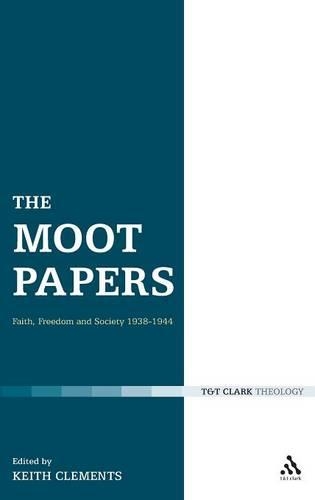
The Moot Papers: Faith, Freedom and Society 1938-1944
(Hardback)
Publishing Details
The Moot Papers: Faith, Freedom and Society 1938-1944
By (Author) Rev'd Dr Keith Clements
Bloomsbury Publishing PLC
T.& T.Clark Ltd
21st December 2009
United Kingdom
Classifications
Tertiary Education
Non Fiction
Religious social and pastoral thought and activity
Religion and politics
261.7
Physical Properties
Hardback
752
Width 156mm, Height 234mm
1234g
Description
The Moot was the study and discussion group set up by J.H. Oldham (1874-1969) following the 1937 Oxford Conference on "Church, Community and State." Its purpose was to continue, in an informal, confidential but serious way, exploration of the relation between church and society and the realisation of Christian ethics in the public sphere. The Moot met twice or three times a year from 1938 to 1947 (21 times in all) and was convened by Oldham with the conscious intention of responding to the grave crisis that was felt to be facing western society in Britain no less than on the continent of Europe. Overall some 35 people attended the Moot at one time or another, but its core comprised a small number of regular members who were representative of the highest levels in theology, social science and public affairs. In addition to Oldham himself they included John Baillie, T.S. Eliot, H.A. Hodges, Eleonora Iredale, Adolf Lwe, Karl Mannheim, Walter Moberly, John Middleton Murry and Alec Vidler. Other participants included Kathleen Bliss, Fred Clarke, Christopher Dawson, H.H. Farmer, Hector Hetherington, Walter Oakshott and Gilbert Shaw, while notables such as Reinhold Niebuhr, Melville Chaning-Pearce, Donald Mackinnon, Philip Mairet, Lesslie Newbigin, William Paton, Frank Pakenham (later Lord Longford), Michael Polanyi and Oliver Tomkins made occasional "guest appearances." Against the background of impending and then actual war, the discussions in the Moot repeatedly focused on the "planned" nature of modern society and therewith the roles (if any) within it of moral choice and the Christian community.
Reviews
The space available to a reviewer denies him the opportunity to comment on the detail of what is here presented. Suffice it to say that here are 700 pages of acute and penetrating thinking about the nature of church and state in their broadest terms that will richly reward study.' -- Baptist Quarterly
'There is no more intriguing and illuminating insight into the war-time mind of Christian intellectuals in Britain than this admirable edition of The Moot Papers.' - Keith Robbins, Historian and Former Vice Chancellor, University of Wales, UK. -- Keith Robbis
Keith Clements' The Moot Papers, Faith, Freedom and Society 1938-44 includes not only the official notes, formerly available only in archival collections, on Oldham's Moot; he also surrounds note sets with helpful interpretative material that places these discussion meetings involving an extraordinary group of intellectuals in their proper historical context. This book is an excellent venue through which to understand the ferment about a cultural crisis and possible Christian responses in the period of World War II. It makes it easy to see how figures like Michael Polanyi came to regard participation in the Moot and later Oldham discussion groups as formative.' - Phil Mullins, Editor Tradition and Discovery: The Polanyi Society Periodical, Missouri Western State University, USA. -- Phil Mullins
What a privilege to eavesdrop on these stimulating discussions! They are full to the brim of vigorous ideas, rigorously debated. Most, in their confidence and commitment, are a reproach to today's shallow consideration of religion's place in society; some appear strangely naive with hindsight. Dr Clements carefully steers both general and specialist reader through this collection, so that they can enjoy its riches to the full.' - Alison Elliot, Centre for Theology and Public Issues, University of Edinburgh, UK. -- Alison Elliot
'This important book represents a landmark in the history of Christian social and political thought in twentieth-century Britain, as it unfolded in the context of dictatorship, war and reconstruction. It would be difficult to exaggerate the significance of what Keith Clements has achieved. This is, quite simply, a fundamental contribution.' - Andrew Chandler, The George Bell Institute, Chichester, UK. -- Andrew Chandler
Article in Churches Together in Sussex
Author Bio
Keith Clements was a Baptist minister and a General Secretary of the Conference of European Churches, Switzerland.
